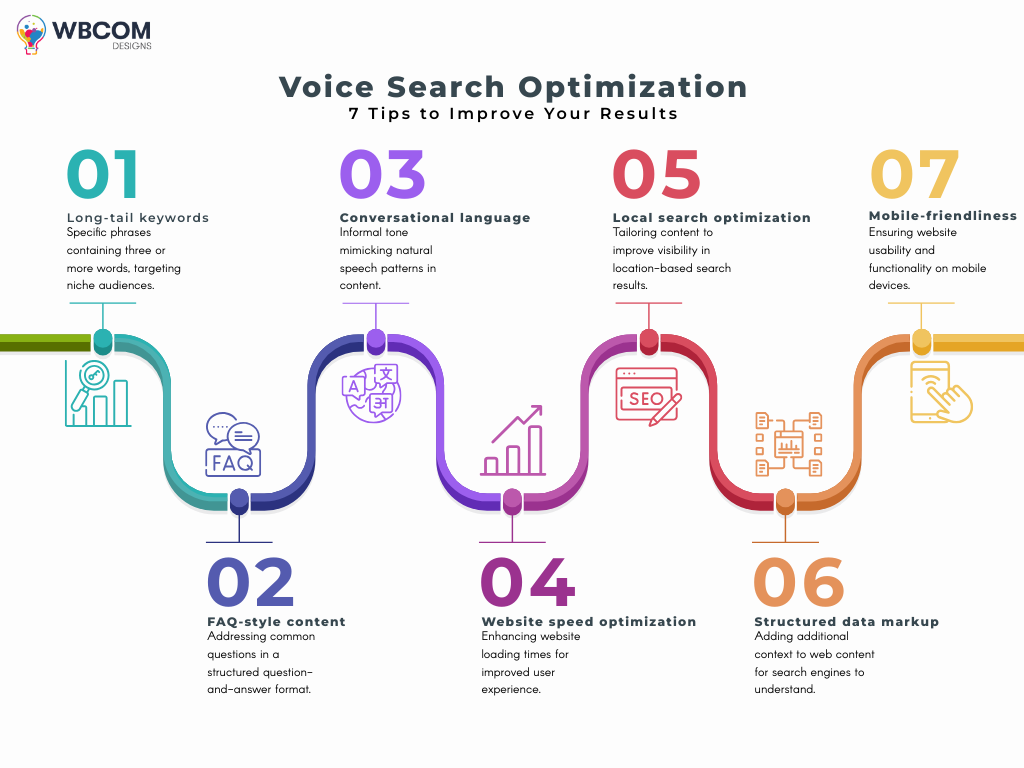Voice Search Optimization is becoming increasingly crucial in the realm of digital marketing as voice-activated devices and virtual assistants continue to rise in popularity. This shift signifies a fundamental change in how users interact with search engines, emphasizing the need for businesses to adapt their strategies accordingly. With voice search, users can simply speak their queries, prompting more conversational and long-tail keyword phrases.
As a result, optimizing for voice search involves tailoring content to match these natural language patterns and ensuring that websites are structured to provide relevant answers to voice queries. Failure to optimize for voice search could result in decreased visibility and missed opportunities for businesses to connect with their target audience effectively. Thus, understanding and implementing voice search optimization strategies have become essential for staying competitive in the digital landscape.
Table of Contents
ToggleUnderstanding Voice Search
Voice search is a technology that enables users to interact with search engines using spoken commands or queries rather than traditional text input methods. Unlike traditional text-based search, where users manually type their queries into a search engine, voice search relies on speech recognition technology to interpret and process spoken words. This mechanism allows users to conduct searches using natural language, making the process more intuitive and conversational.
In comparison to text-based search, voice search tends to produce more conversational and long-tail keyword phrases, reflecting the way people naturally speak. Additionally, voice search results are often provided verbally by virtual assistants like Siri, Google Assistant, or Amazon Alexa, rather than visually on a search engine results page. This shift in search behavior necessitates a different optimization approach, emphasizing the importance of understanding the nuances of voice search and tailoring strategies accordingly.
Also Read: Best Practices in the Design and Development of Apps
Importance of Voice Search Optimization
Impact of voice search on search engine results
- Changing search patterns: Voice search has led to a shift in user search behavior, with more natural language queries being used compared to text-based searches.
- Altered keyword strategies: Voice search queries tend to be longer and more conversational, requiring businesses to adapt their keyword strategies to match these patterns.
- Influence on search rankings: Optimizing for voice search can impact search engine rankings, as search algorithms increasingly prioritize relevant and conversational content.
Benefits of optimizing for voice search in improving online visibility
- Enhanced user experience: Voice search optimization can lead to improved user experiences by providing more relevant and accurate results to spoken queries.
- Increased website traffic: Optimizing for voice search can improve a website’s visibility in search engine results, leading to increased organic traffic and potential customer engagement.
- Competitive advantage: Businesses that optimize for voice search can gain a competitive edge by staying ahead of the curve and meeting the evolving needs of users.
- Better audience targeting: Voice search optimization allows businesses to better understand and cater to their target audience’s preferences and behaviors, leading to more effective marketing strategies.
- Future-proofing: With the continued growth of voice search technology, optimizing for voice search now can future-proof businesses and ensure they remain relevant in the evolving digital landscape.
Also Read: Balancing Academics and Blogging: Strategies for Student Bloggers
7 Tactics to Improve Your Voice Search Optimization

1. Use long-tail keywords
Long-tail keywords are phrases that consist of three or more words and are more specific than generic keywords. Since voice searches often involve natural language and complete sentences, optimizing for long-tail keywords helps match the user’s query more accurately. Conduct keyword research to identify relevant long-tail keywords related to your industry or niche, and incorporate them naturally into your content.
2. Focus on conversational language
Voice search queries tend to be more conversational and resemble how people speak in everyday language. To optimize for voice search, create content that sounds natural and conversational, addressing common questions or topics related to your business or industry. Avoid overly formal or technical language, and aim to provide clear and concise answers to potential voice search queries.
3. Optimize for local search
Many voice searches are location-based, with users seeking information about nearby businesses, attractions, or services. To improve your visibility in local voice search results, ensure that your business information, such as name, address, and phone number (NAP), is consistent and up-to-date across online directories and listings. Incorporate location-specific keywords into your content, and consider creating location-based landing pages or content targeting local audiences.
4. Create FAQ-style content
Anticipate common questions that users might ask related to your business, products, or services, and create content that provides clear and comprehensive answers. FAQ pages, blog posts, or videos addressing frequently asked questions can help optimize your site for voice search queries. Structure your content in a question-and-answer format, and use headings or bullet points to make it easier for voice assistants to extract relevant information.
5. Improve website loading speed
Website speed is a crucial factor in both traditional and voice search optimization. Slow-loading websites can frustrate users and negatively impact your search engine rankings. Optimize your website’s loading speed by optimizing images, minifying CSS and JavaScript files, leveraging browser caching, and using a content delivery network (CDN). Test your website’s performance regularly using tools like Google PageSpeed Insights or GTmetrix, and address any issues that may be affecting loading times.
6. Leverage structured data markup
Structured data markup, also known as schema markup, provides search engines with additional context about your content, making it easier for them to understand and index your site for voice search. Implement structured data markup on your website to mark up key information such as business details, product information, reviews, and FAQs. This can help enhance your search engine listings with rich snippets, knowledge panels, and other interactive features that may be displayed in voice search results.
7. Ensure mobile-friendliness
With the increasing prevalence of mobile devices, many voice searches are performed on smartphones and tablets. Therefore, it’s essential to ensure that your website is mobile-friendly and provides a seamless user experience across different screen sizes and devices. Use responsive design principles to optimize your site for mobile, and test its performance on various devices to ensure that it loads quickly and functions properly. Consider implementing mobile-specific features such as click-to-call buttons or mobile-friendly navigation menus to enhance the mobile user experience.
Also Read: 13 Innovative Ways To Enhance Your eCommerce Website For Apparel Sales
Challenges and Considerations
Limitations and challenges of voice search optimization
- Lack of keyword data: Unlike text-based searches, voice searches often do not provide keyword data, making it challenging for marketers to identify and target specific search terms.
- Natural language processing limitations: Voice assistants may struggle to accurately interpret complex or ambiguous queries, leading to less relevant search results.
- Local search accuracy: Voice search accuracy can vary depending on the user’s location, language, and accent, posing challenges for businesses targeting diverse audiences.
- Competition for top positions: Voice search typically returns only one or a few results, intensifying competition among businesses vying for top positions in search results.
- Evolving technology: Voice search technology is continually evolving, requiring marketers to stay updated on new developments and adapt their strategies accordingly.
Factors to consider when implementing voice search strategies
- User Intent: Understand the intent behind voice search queries and tailor your content to address users’ needs and preferences effectively.
- Natural language optimization: Optimize your content for natural language patterns and conversational queries to align with how users interact with voice assistants.
- Local optimization: Incorporate location-specific keywords and information to improve visibility in local voice search results, particularly for businesses with physical locations.
- Mobile optimization: Ensure that your website is mobile-friendly and provides a seamless user experience across different devices, as many voice searches are performed on smartphones and tablets.
- Analytics and tracking: Implement tools and analytics to track voice search performance and gain insights into user behavior, search trends, and opportunities for optimization.
Future Trends and Developments
Predictions for the future of voice search optimization
- Continued growth in adoption.
- Advancements in natural language processing.
- Expansion of voice commerce.
- Integration with IoT devices.
- Localization and personalization.
Emerging technologies and features
- Voice-powered visual search.
- Multi-modal interactions.
- Voice synthesis and customization.
- AR integration.
- Enhanced privacy and security measures.
Conclusion
Voice search optimization has become increasingly crucial in digital marketing strategies, given the rising popularity of voice-activated devices and virtual assistants. By optimizing for voice search, businesses can enhance their online visibility, improve user experience, and stay ahead of the competition in today’s dynamic digital landscape. As voice search continues to evolve, marketers must recognize its importance and adapt their strategies accordingly.
Leveraging voice search technology can not only improve digital marketing results but also enable businesses to better meet the needs and preferences of their target audience. As we look to the future, embracing voice search optimization will be essential for staying relevant and competitive in the ever-changing world of digital marketing.
Interesting Reads:
Essential Strategies for Effective Full-Stack Development and API Integration
Understanding the Relationship Between Earned Links & Innovative Web Design








